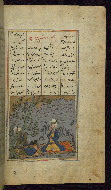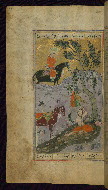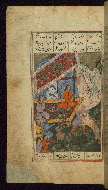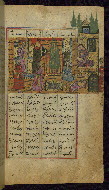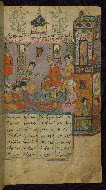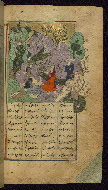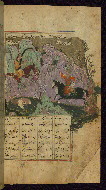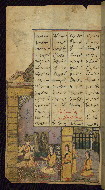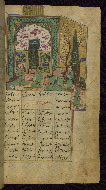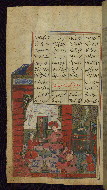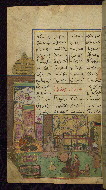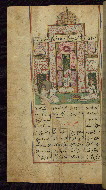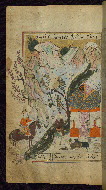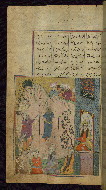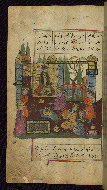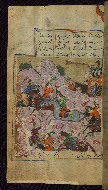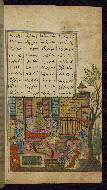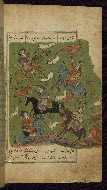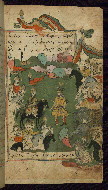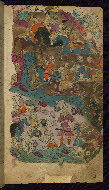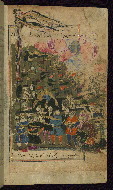Home > Digitized Walters Manuscripts
This document is a tranformation of a TEI P5 XML manuscript description incorporating images. If you have trouble reading special or non-Latin characters on this page, please make sure you have appropriate Unicode fonts installed and an up-to-date web browser.
Walters Ms. W.612, Five poems (quintet)
Browse images (Browse images in a new window) | TEI in XML format
W.612
Five poems (quintet)
Vernacular: خمسه نظامى
Authority name: Niẓāmī Ganjavī, 1140 or 41-1202 or 3
Supplied name: Ilyās ibn Yūsuf Niẓāmī Ganjavī
Name, in vernacular: الياس بن يوسف نظامى گنجوى
Note: Author dates preferred by cataloger: d. 605 AH / 1209 CE
This illuminated and illustrated Safavid copy of the Khamsah (quintet) of Niẓāmī Ganjavī (d. 605 AH / 1209 CE) dates to the eleventh century AH / seventeenth CE. The codex opens with a double-page illuminated frontispiece (fols. 1b-2a). Each of the five poems begins with an illuminated headpiece (fols. 32b, 117b, 176b, 240b, 331b), and there are thirty-six illustrations. The lacquer binding is not original to the manuscript.
11th century AH / 17th CE
Iran
Book
Literary -- Poetry
The primary language in this manuscript is Persian.
Foliation: i+380
Catchwords: Written obliquely on versos
16.5 cm wide by 27.0 cm high
10.5 cm wide by 19.5 cm high
- Columns: 4
- Ruled lines: 20
- Framing lines in blue, red, gold, and black
- Title: Khamsah-i Niẓāmī
- Author: Niẓāmī Ganjavī, 1140 or 41-1202 or 3
- Incipit: بسم الله الرحمن الرحيم هست كليد در كنج حكيم...
- Text note: Contains: Makhzan al-asrār (fols. 1b-31b); Khusraw va Shīrīn (fols. 32b-117a); Laylá va Majnūn (fols. 117b-176a); Haft paykar (fols. 176b-240a); and Iskandarnāmah, divided into Sharafnāmah (fols. 240b-331a) and Iqbālnāmah (fols. 331b-380a); title of each poem not indicated; some folios supplied later
- Hand note: Written in black nastaʿlīq script with chapter headings in red
- Decoration note: Thirty-six illustrations; double-page illuminated frontispiece (fols. 1b-2a); headpieces without inscriptions; framing lines in blue, red, gold, and black
fol. 1b:
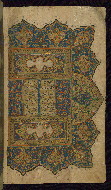
- Title: Double-page illuminated frontispiece
- Form: Frontispiece
- Text: Makhzan al-asrār
- Label: This is the right side of a double-page illuminated frontispiece that begins the first poem of the Khamsah, Makhzan al-asrār.
fol. 23b:
fol. 32b:
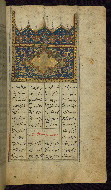
- Title: Incipit page with illuminated headpiece
- Form: Incipit; headpiece
- Text: Khusraw va Shīrīn
- Label: This incipit page has an illuminated headpiece beginning the second poem of the Khamsah: Khusraw va Shīrīn.
fol. 40b:
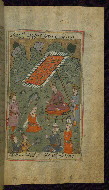
- Title: Khusraw before his father, Hurmuz, asking for forgiveness
- Form: Illustration
- Text: Khusraw va Shīrīn
fol. 48a:
fol. 57a:
fol. 72b:
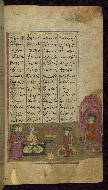
- Title: Farhād is summoned to dig a channel through a rocky mountain
- Form: Illustration
- Text: Khusraw va Shīrīn
fol. 79b:
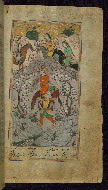
- Title: Farhād carries Shīrīn and her dead horse on his shoulders
- Form: Illustration
- Text: Khusraw va Shīrīn
fol. 89b:
fol. 98b:
fol. 109b:
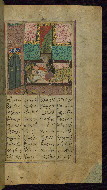
- Title: Shīrūyah kills his father, Khusraw, because of his love for Shīrīn
- Form: Illustration
- Text: Khusraw va Shīrīn
fol. 110b:
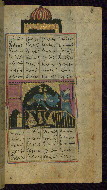
- Title: Shīrīn commits suicide after the murder of Khusraw
- Form: Illustration
- Text: Khusraw va Shīrīn
fol. 117b:
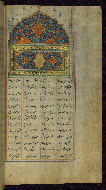
- Title: Incipit page with illuminated headpiece
- Form: Incipit; headpiece
- Text: Laylá va Majnūn
- Label: This incipit page has an illuminated headpiece beginning the third poem of the Khamsah: Laylá va Majnūn.
fol. 160b:
fol. 176b:
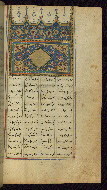
- Title: Incipit page with illuminated headpiece
- Form: Incipit; headpiece
- Text: Haft paykar
- Label: This incipit page has an illuminated headpiece beginning the fourth poem of the Khamsah: Haft paykar.
fol. 186b:
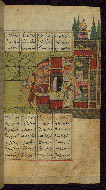
- Title: Nuʿmān, father of Bahrām Gūr, throws a builder from the roof of the palace Khavarnaq
- Form: Illustration
- Text: Haft paykar
fol. 195b:
fol. 202a:
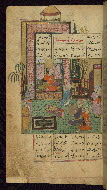
- Title: Bahrām Gūr entertains Shīdah, the builder of the seven pavilions
- Form: Illustration
- Text: Haft paykar
fol. 209a:
fol. 212b:
fol. 215a:
fol. 221a:
fol. 226a:
fol. 232a:
fol. 236a:
fol. 240b:
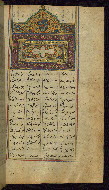
- Title: Incipit page with illuminated headpiece
- Form: Incipit; headpiece
- Text: Sharafnāmah
- Label: This incipit page has an illuminated headpiece beginning Sharafnāmah, the first half of the fifth poem of the Khamsah: Iskandarnāmah.
fol. 253a:
fol. 259a:
fol. 268a:
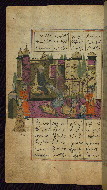
- Title: An official reads a letter to Alexander the Great, sent to him by Darius
- Form: Illustration
- Text: Sharafnāmah
fol. 288b:
fol. 292a:
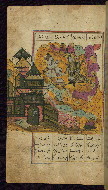
- Title: Alexander the Great, unable to destroy a fortress, consults a hermit
- Form: Illustration
- Text: Sharafnāmah
fol. 296a:
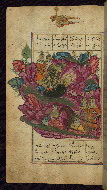
- Title: Alexander the Great at a cave where Kay Khusraw is buried that emits flames
- Form: Illustration
- Text: Sharafnāmah
fol. 301b:
fol. 307b:
fol. 320b:
fol. 328a:
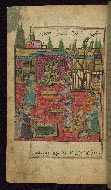
- Title: An official weighs the precious stone Alexander the Great found in the darkness
- Form: Illustration
- Text: Sharafnāmah
fol. 329a:
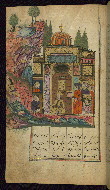
- Title: A man tells Alexander the Great a story of a country in which there is no death
- Form: Illustration
- Text: Sharafnāmah
fol. 331b:
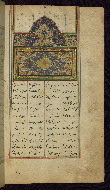
- Title: Incipit page with illuminated headpiece
- Form: Incipit; headpiece
- Text: Iqbālnāmah
- Label: This incipit page has an illuminated headpiece beginning Iqbālnāmah, the second half of the fifth poem of the Khamsah: Iskandarnāmah.
fol. 339a:
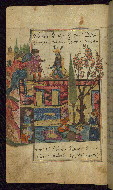
- Title: Alexander the Great listens to a story about a prince whose wife was sick
- Form: Illustration
- Text: Iqbālnāmah
fol. 343b:
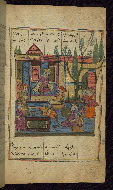
- Title: A rich merchant is summoned before a Greek king and his prime minister
- Form: Illustration
- Text: Iqbālnāmah
fol. 345b:
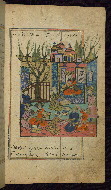
- Title: Hermes, in front of Alexander the Great, and the Greek scholars who disagreed with him
- Form: Illustration
- Text: Iqbālnāmah
fol. 374b:
The binding is not original.
Lacquer boards with floral design (no flap)
Walters Art Museum, 1931, by Henry Walters bequest
Storey, C. A. Persian Literature: A Bio-Bibliographical Survey, Vol. 2. (London: Luzac, 1927- ), 438-495.
Principal cataloger: Gacek, Adam
Catalogers: Landau, Amy; Smith, Sita
Editor: Bockrath, Diane
Conservators: Jewell, Stephanie; Quandt, Abigail
Contributors: Barrera, Christina; Emery, Doug; Herbert, Lynley; Noel, William; Simpson, Shreve; Tabritha, Ariel; Toth, Michael B.; Valle, Chiara
The Walters Art Museum
Licensed for use under Creative Commons Attribution-NonCommercial-ShareAlike 3.0 Unported Access Rights, http://creativecommons.org/licenses/by-nc-sa/3.0/legalcode. It is requested that copies of any published articles based on the information in this data set be sent to the curator of manuscripts, The Walters Art Museum, 600 North Charles Street, Baltimore MD 21201.
